Over the past 80 years, since the birth of the National Assembly of the Democratic Republic of Vietnam, the Vietnamese National Assembly has always been the place where the wisdom, courage and aspirations of the entire nation crystallize. From here, great decisions have been made, not only to govern the country, but also to pave the way for the future.
Throughout that journey, the National Assembly has always placed education at the center of national development, not only as a management field, but as a "top national policy", the foundation for creating new, integrated and progressive Vietnamese people.
Turning point of Vietnamese education
Right from the 1946 Constitution, the first Constitution of independent Vietnam, the idea that “everyone has the right to education” was affirmed. It was not only a right, but also a declaration of knowledge, of the aspiration to enlighten the nation.
Through each historical period, the Vietnamese National Assembly has always been steadfast in its goal of comprehensive education development. A series of laws, resolutions, and policies have been issued, gradually perfecting the institution, opening up a solid legal corridor for the fundamental and comprehensive innovation of education and training.
From that consistent spirit, Vietnamese education increasingly bears a humanistic mark, oriented towards people, taking the development of qualities, capacities and global citizenship as its core goal.
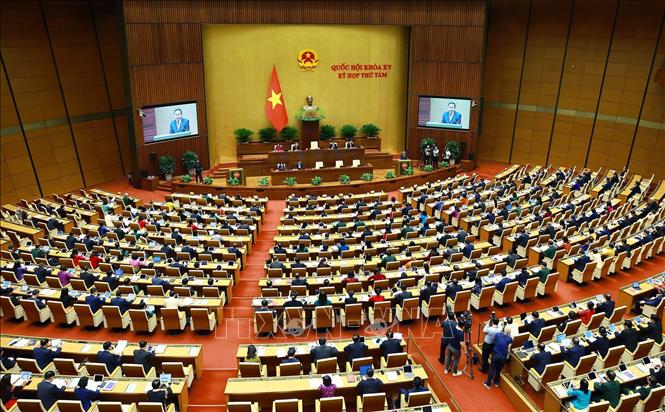
The National Assembly discussed in the hall the draft Law on Teachers. Photo: VNA.
An important milestone in that journey is Resolution 29-NQ/TW in 2013 of the Central Executive Committee on fundamental and comprehensive innovation in education and training. The spirit of the resolution was concretized by the National Assembly in the 2019 Education Law, laying the foundation for a new philosophy: "Shifting from imparting knowledge to developing learners' qualities and capacities".
It was a historic turning point in legislative thinking, considering learners as the center, teachers as the decisive factor, and quality as the measure of all policies.
Then, Resolution 88/2014/QH13 on innovation of general education programs and textbooks opened a period of extensive reform. For the first time, the program was designed in an open and flexible direction, promoting thinking, practice and creativity. From this resolution, tens of thousands of teachers were trained, millions of students were exposed to new learning methods, learning to understand, learning to do and learning to live together.
Law on Teachers 2025 - a humanistic symbol of legislative thinking
On June 16, 2025, at the 7th Session, the 15th National Assembly passed the Law on Teachers No. 73/2025/QH15, effective from January 1, 2026 - a historic milestone for the Vietnamese education sector.
This law not only closes the legal gap that has lasted for many years, but also demonstrates humane, progressive and respectful legislative thinking towards the teaching profession, the "noblest of the noble professions".
According to Mr. Doan Quang Vu, former Head of the Department of Education and Training of Nam Truc district, Nam Dinh province, the birth of the Law on Teachers is "proof of the timely attention of the National Assembly to the team of teachers, those who are day and night carrying out the mission of educating people."
He emphasized: "The law not only protects the honor and dignity of teachers, but also arouses professional pride, motivating teachers to confidently dedicate themselves and be creative in teaching."
A vivid demonstration of the effectiveness of educational innovation policies issued by the National Assembly is Nam Tien Primary School (formerly Nam Truc district, now Nam Minh commune, Ninh Binh province), a unit that has been at the forefront of innovation and creativity for many years.
Implementing the spirit of the 2019 Education Law and Resolution 29-NQ/TW, the school has been proactive and flexible in implementing the new general education program, especially focusing on getting students acquainted with Informatics, STEM education and robot programming right from grade 1. Here, students can directly assemble, control and program KCbot and VEX IQ robots, turning knowledge of Mathematics - Science - Technology into exciting practical experiences.
As a result, the school's students have continuously achieved high results in STEM and robotics competitions; typically in 2023, the robot team consisting of 4th grade students won first prize in the Central KCbot programming competition organized by the Central Committee of the Ho Chi Minh Communist Youth Union.
Not only students, the teaching staff of Nam Tien Primary School also affirmed their creativity when many of them won high prizes in competitions for designing electronic lessons and developing digital teaching equipment, contributing to spreading the spirit of innovation and modernizing teaching methods throughout the education sector.
Along with that, the Law on Teachers also sets out new requirements: teachers must constantly learn, master technology, maintain ethics and professional courage in the context of many social changes. Practice in recent years has clearly shown the vitality of these decisions. Schools have boldly innovated teaching methods, linking theory with practice, encouraging students to learn through experience and discovery.
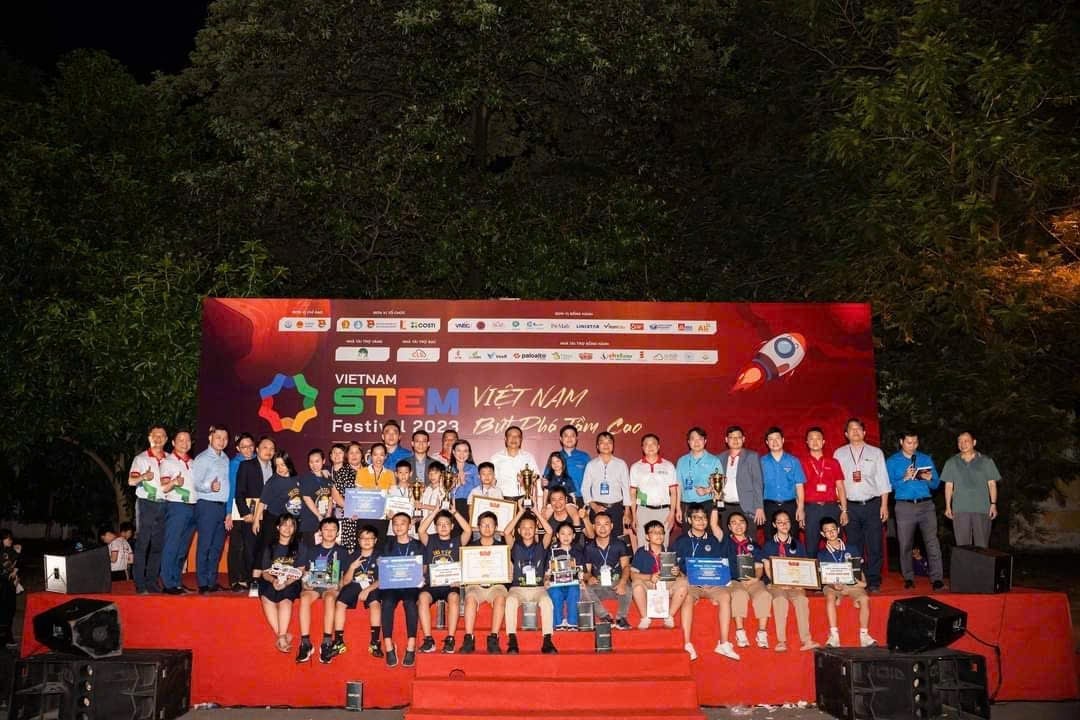
Robotics team of Nam Tien Primary School at the 2023 National STEM Festival Award Ceremony. Photo: Le Hanh.
The movement “Happy School - Happy Teachers - Active Students” has spread widely; STEM models, digital transformation, digital learning resources, and online learning platforms have been strongly deployed. Thanks to that, teachers are increasingly more professional, students are more confident and creative, contributing to building a humane and modern learning environment.
In particular, together with the 2019 Education Law and Resolution 193/2025/QH15 on the mechanism to promote science and technology, innovation and digital transformation, the National Assembly has formed a solid "policy triangle" for modern education.
Despite many achievements, Vietnamese education still faces many challenges: regional disparities, uneven facilities, a number of teachers still afraid of innovation, while pressure from social media sometimes damages the image of teachers.
In that context, the role of the National Assembly becomes increasingly crucial, not only in enacting laws, but also in monitoring, evaluating and listening to voices from school practices. Each discussion session and each law passed is the crystallization of responsibility for the future of the nation.
From the parliament to the classroom is a long distance, but the resolutions, laws and educational policies of the National Assembly are shortening that distance day by day. Thanks to visionary and humane decisions, Vietnamese education today has a more solid foundation, is more modern and more humane.
Education is no longer just a journey of "transferring knowledge", but has become a journey of "awakening human potential", in line with the spirit that the National Assembly always affirms: "Developing education is developing people, and developing people is developing the nation".
Looking back 80 years, the mark of the Vietnamese National Assembly has been imprinted on every step of progress in the country's education, from affirming the right to study of every citizen, to innovating programs and textbooks, promulgating the Law on Teachers, promoting digital transformation and international integration.
All of these create a journey of persistent, humane and aspirational creation, towards a Vietnamese education that is liberal, creative, integrated and humane, capable of nurturing the nation's aspirations to rise in the knowledge era.
Source: https://nongnghiepmoitruong.vn/quoc-hoi-viet-nam-nhung-quyet-sach-kien-tao-giao-duc-vi-tuong-lai-dat-nuoc-d783466.html



![[Photo] Prime Minister Pham Minh Chinh chairs a meeting on housing policy and the real estate market.](https://vphoto.vietnam.vn/thumb/1200x675/vietnam/resource/IMAGE/2025/11/11/1762838719858_dsc-2107-jpg.webp)



![[Photo] Chu Noodles - the essence of rice and sunshine](https://vphoto.vietnam.vn/thumb/1200x675/vietnam/resource/IMAGE/2025/11/11/1762846220477_ndo_tl_7-jpg.webp)




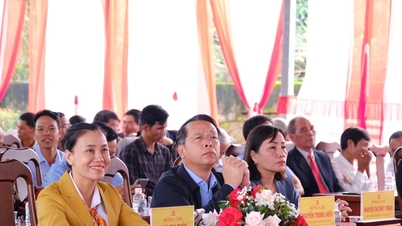

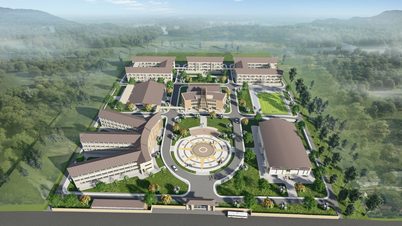

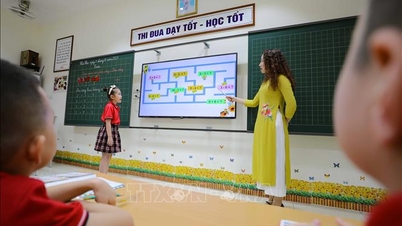
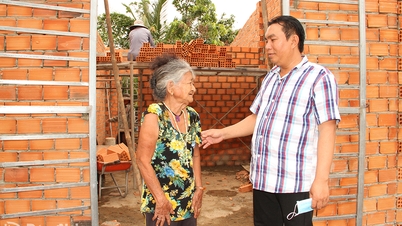




















































































![Dong Nai OCOP transformation: [Article 4] Reaching national standard products](https://vphoto.vietnam.vn/thumb/402x226/vietnam/resource/IMAGE/2025/11/11/1762825820379_4702-cac-san-pham-trai-cay-chung-nhan-ocop-nongnghiep-174649.jpeg)


![Dong Nai OCOP transition: [Article 3] Linking tourism with OCOP product consumption](https://vphoto.vietnam.vn/thumb/402x226/vietnam/resource/IMAGE/2025/11/10/1762739199309_1324-2740-7_n-162543_981.jpeg)






Comment (0)